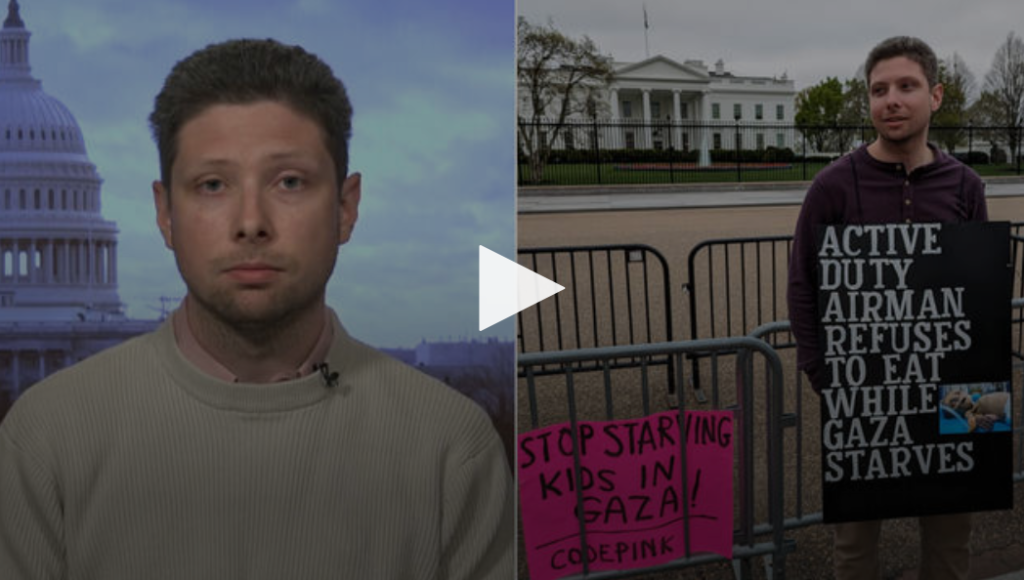
From Democracy Now | Original Article
Democracy Now! speaks with an active-duty soldier in the U.S. Air Force on hunger strike to demand an immediate ceasefire in Gaza. Senior Airman Larry Hebert is on day three of his hunger strike outside the White House, where he has been holding a sign that reads “Active Duty Airman Refuses to Eat While Gaza Starves.” “It’s just completely wrong and immoral for civilians to be starved and bombed and targeted in any manner,” says Hebert. “I’m hoping that other active-duty members will be more public with their concern over the atrocities happening in Gaza.” Hebert was inspired by the actions of Aaron Bushnell, a 25-year-old active-duty member of the U.S. Air Force who set himself on fire in front of the Israeli Embassy in Washington, D.C., in February to demand a Gaza ceasefire. “What really infuriated me was the silence thereafter. … I don’t know a single member of our government or leaders in the military that really spoke on Aaron, even uttered his name,” says Hebert, who is now looking to leave the military after learning more about U.S. foreign policy. “I can’t see myself continuing service.”
AMY GOODMAN: This is Democracy Now! I’m Amy Goodman, with Juan González.
We turn now to an active-duty member of the U.S. Air Force who started a hunger strike Sunday outside the White House to demand an immediate ceasefire in Gaza. Senior Airman Larry Hebert has been been holding a sign that reads “Active Duty Airman Refuses to Eat While Gaza Starves.” He’s on day three of his hunger strike while on leave from his duty station in Spain. Larry says he was inspired in part by the actions of Aaron Bushnell, the 25-year-old active-duty member of the U.S. Air Force who set himself on fire in front of the Israeli Embassy in Washington, D.C., in February to demand a Gaza ceasefire. He died.
Senior Airman Larry Hebert joins us now from Washington, D.C., where he’s also hoping to meet with members of Congress. He’s a member of Veterans for Peace.
Larry, welcome to Democracy Now! Can you explain your hunger strike in front of the White House?
LARRY HEBERT: Yes. Thank you. And thank you for having me on, Ma’am. I appreciate it.
So, my hunger strike is obviously in solidarity with the civilians in Gaza. You know, it’s just completely wrong and immoral for civilians to be starved and bombed and targeted in any manner. So, that’s what the hunger strike is specifically for.
JUAN GONZÁLEZ: And, Larry, you took authorized leave from your assignment at your naval station in Spain to do this protest. How did you get the permission, and what’s been the response of your superiors?
LARRY HEBERT: Well, to take authorized leave, that’s earned just through, you know, continuing my service, so there’s no specifics on what I have to provide them as far as what I’ll be doing on leave, just that I am taking leave and where, roughly, I’m going.
AMY GOODMAN: Have you gotten response from them, given what you’re doing as you stand in front of the White House conducting your hunger strike?
LARRY HEBERT: I’ve had a couple members from my command reach out. And I expect to speak to my commander fairly soon, yeah.
AMY GOODMAN: You want to become a conscientious objector?
LARRY HEBERT: Yes. I mean, I think that’s one of the routes that can be taken. While that process is going, if my command wants to work with me and work out a deal where I’m in either a reassignment or possibly some sort of mutual discharge, I would accept that, as well.
JUAN GONZÁLEZ: And you’ve mentioned the tragedy of Aaron Bushnell and how that affected your outlook and decision. Could you talk about that a little more?
LARRY HEBERT: Yeah. So, what Aaron did was courageous and emotional for me. It really resonated, because what he was feeling was exactly how I was feeling. And obviously, I’m not going to that extent. I don’t think anyone needs to. I think what he did was unique and, you know, was effective.
But what really infuriated me was the silence thereafter his actions. I don’t know a single member of our government or leaders in the military that really spoke on Aaron, even uttered his name. But I had seen people in Yemen and in Gaza, you know, holding up his picture and sending their condolences. And I even saw the official statement from Hamas, who is a deliberate enemy of our military and our government. They issued an official statement sending their condolences to Aaron and his family. So, it really broadened my perspective to see, you know, even our adversaries speaking out and sending their condolences to our own military members.
AMY GOODMAN: Do you have a message, Larry, for other members of the military in the United States or other militaries around what’s going on right now in Gaza? And as you stand in front of the White House and hope to speak to congressmembers in Washington, D.C., what is your message?
LARRY HEBERT: I hope, firstly, that with Aaron’s actions and the members of the State Department that spoke out recently and myself, I’m hoping that other active-duty members will be more public with their concern over the atrocities happening in Gaza. It’s not even — it’s not even a political issue at this point. It’s civilian lives that are on the line, and they are being bombed, shot, raped and starved. There is a mass starving going on, and it’s unconscionable, and it shouldn’t be allowed. And it breaks international law, as well as our own laws.
And I don’t think — I know a lot of active-duty members may be afraid to speak out, but the truth is, is that the military is supposed to be — or at least in the U.S., is supposed to be held to the highest of standards. And what’s happening in Gaza is not the highest of standards. And people need to recognize that and be more public about it.
JUAN GONZÁLEZ: And, Larry, you talk about violations of federal law. Veterans for Peace, that you belong to, recently called on the U.S. inspector general to investigate illegal shipments of weapons to Israel. Could you talk about what those violations that you believe are?
LARRY HEBERT: Right. So, I haven’t gone into the logistics of the law itself. I’m not an expert matter on law. But, I mean, you can speak to the experts. Like, we just had on Democracy Now! the woman from the State Department who spoke out and referenced specific laws that were in breach. Veterans for Peace, who I just recently joined, they have the very specific details that they can issue and speak more on.
AMY GOODMAN: Finally, Larry, you were there in front of the White House as families went onto the White House lawn to engage in the egg hunt, the Easter egg hunt. They were reading your sign. You have two small children. Can you talk about, as we wrap up, why you joined the U.S. military?
LARRY HEBERT: Yeah. So, my reason for joining was I met a lot of veterans when I was working in Oklahoma. And I met retired marine — or, Marines, retired Air Force, retired Army. I met a lot of different backgrounds. And they all told me that joining the Air Force would set me up for life, through education, through housing, through, you know, just the basic pay. And while that was true, there is an element that I realize that I didn’t understand the entirety of, you know, our foreign policy. So, that was my reason for joining. And I don’t entirely regret my time in the military, but now that I’m more aware of our foreign policy and what’s going on, I definitely — I can’t see myself continuing service.
AMY GOODMAN: Well, I want to thank you so much for being with us. I know this is one of the first TV interviews you’ve done, and you are on the third day of your hunger strike. Larry Hebert, active-duty Air Force senior airman, on hunger strike for a ceasefire in Gaza, member of Veterans for Peace, speaking to us from Washington, D.C.
